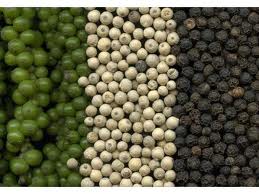Vietnam’s pepper faces difficulties because of India’s ban
Tuesday, March 21,2017
AsemconnectVietnam - The Ministry of Industry and Trade (MOIT) and the Ministry of Agriculture and Rural Development (MARD) are working with Indian counterparts on the removal of the country’s ban on imports of six agri-products from Vietnam.
Fertilizer export markets in first 5 months of 2023
Exports of animal feed reached 426.3 million USD in first 5 months of 2023
Imports of animal feed reached over 1.93 billion USD in first 5 months of 2023
DAILY: Vietnamese pepper prices fell by 500 VND on June 23
DAILY: Vietnamese coffee prices rose by 200 VND on June 23
Exports to China reached 20.3 billion USD in first 5 months of 2023
Coffee exports surpassed 2 billion USD in first 5 months of 2023
Vietnam considered rising star to become emerging market
Vietnam logistics sector offers attractive investment opportunities
Hanoi’s economy sees effective recovery
Reference exchange rate on upward trend
Vietnam lychee market update: Harvest in Central Highlands a success
DAILY: Vietnamese pepper prices fell by 500 VND on June 22
DAILY: Vietnamese coffee prices fell by 500 VND on June 22

Plan on implementing national strategy on climate change ...
Actively and effectively adapting, reducing vulnerability, loss and damage due to climate change; reduce greenhouse gas emissions ...Scheme on attracting, restructuring and improving quality ...
Urban development plan of Binh Phuoc province in a period ...
Plan on implementing Decision No. 327/QD-TTG dated March ...

Hung Kings Temple Festival 2023 kicks off
The Hung Kings Temple Festival 2023 and the Culture and Tourism Week of Ancestral Land 2023 kicked off in the northern province of Phu Tho ...Vietnam trounce Palestine at AFC U-17 Women's Asian ...
Phu Tho: Festival honours UNESCO intangible cultural ...
Saigontourist Group Food and Culture Festival 2023 opens
Vietnam’s top swimmer Huy Hoang to hold Vietnamese flag at ...



